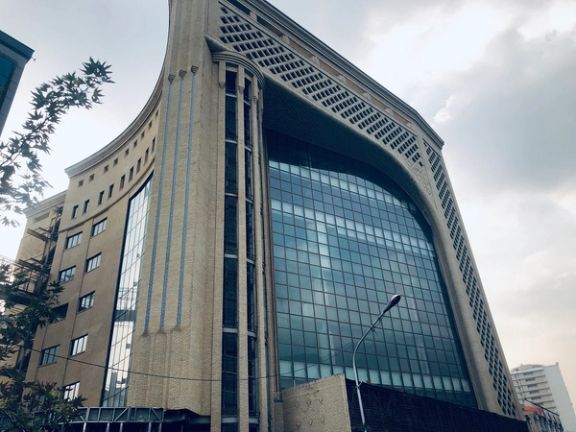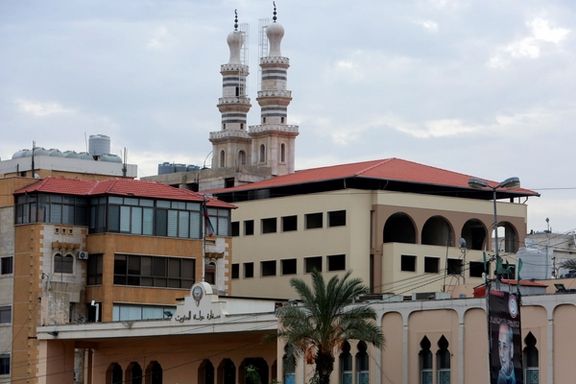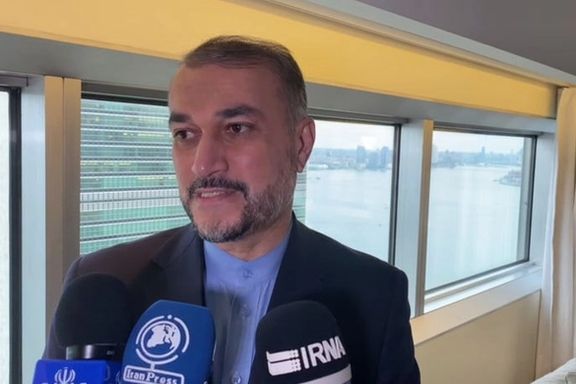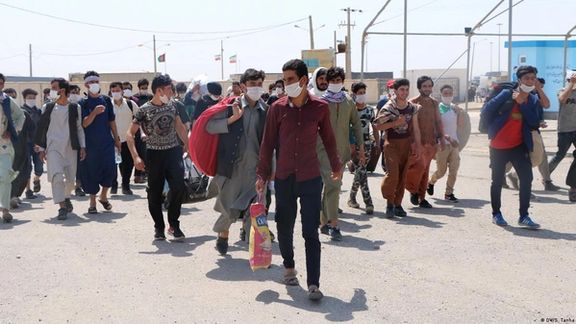With UN Sanctions Expired, Russia To Expand Military Ties With Iran

After the end of the UN's sanctions on Iran's missile program, Russia has announced plans to deepen military ties with the regime.

After the end of the UN's sanctions on Iran's missile program, Russia has announced plans to deepen military ties with the regime.
Russia's Deputy Foreign Minister Sergei Ryabkov made the announcement on Wednesday, just days after the October 18 expiration which now allows Iran to sell drones, ballistic missiles, and long-range strike technologies to its anti-Western partners and clients. Ending the sanctions also means Iran can now purchase its own technology to further develop its capabilities.
“We will develop our cooperation on a mutually beneficial basis as we did before - in full compliance with international obligations and existing regimes in this area," Ryabkov said. "Now, after the expiration of some restrictive provisions of resolution 2231, there are fewer such restrictive regimes. Naturally, we will be using this, and it should not raise any questions for anyone.”
Iran, a historical ally of Russia, is accused of supplying lethal drones to Moscow for use in Ukraine, but it has asserted its neutrality in the conflict.
Earlier, the US Treasury Department's Office of Foreign Assets Control took measures in response to the expiration of the UN arms embargo against Iran by imposing sanctions on 11 individuals, eight entities, and one vessel based in Iran, China, Hong Kong, and Venezuela.
These sanctions were applied on the grounds that these entities allegedly supported Iran's Islamic Revolutionary Guard, Ministry of Defense, and Armed Forces Logistics in their efforts related to missile and drone production and proliferation.

The research center of Iran’s parliament forecasts a budget deficit of $7.6 billion at the end of the Iranian calendar year (March 19, 2024), despite much higher estimates.
The report by the think tank notes that just in the first four months of the current Iranian year (starting March 21, 2023), the Iranian government’s budget deficit can be estimated as 1.02 billion.
The deficit can increase to $10 billion as the government is obligated to fund different kinds of subsidies, including the subsidy of bread.
The numbers in the think tank’s report run counter to the statistics provided earlier by Iranian officials indicating a much higher budget deficit.
Speaking about the budget imbalance, Davoud Manzour, the head of Planning and Budget Organization (PBO), had earlier confirmed that 30 percent of the expected revenues have failed to be realized in the first seven months of the year. This implies a budget deficit of $7.92 billion during that period. If this trend persists, it could culminate in a budget deficit of $13.5 billion, marking the highest budget deficit in Iran's history.
A report released by reformist daily Ham-Mihan on October 16 also forecasted a budget deficit twice as big as the figure in the previous year.
According to the parliament’s research center, the revenues expected to be derived from the sales of oil and oil products have fallen short of estimates when the budget was drafted in early 2023 and this is the main reason behind the Iranian government’s enormous budget deficit.

The United States Embassy in Kuwait has issued a security alert in response to threats made by the pro-Iran militant group Alwiyat al-Waad al-Haq (AWH).
AWH is considered to be affiliated with the quasi-military organization Asa'ib Ahl al-Haq, which is under the control of the Quds Force of the Islamic Revolutionary Guard Corps.
The group, in its fifth threat announcement since 2021, has deemed American bases in Kuwait and the United Arab Emirates as legitimate targets.
A statement from the embassy confirmed the threats and said all activity was being downgraded to "essential" only.
"The embassy is aware of threats made on social media by Alwiyat al-Waad al-Haq, a militia group in Iraq, against US military bases in Kuwait," it said. "As a result, the US Embassy in Kuwait is limiting its activity on US military bases to essential and official events only. US citizens are advised to remain alert."
AWH cited their actions as retaliation for what they described as "crimes of the Zionist entity and America," as well as in honor of the "martyrs of beloved Palestine," amid the Hamas-Israel conflict which broke out on October 7. Thousands of militia from Iran-backed Hamas invaded Israel's borders, killing over 1,500 and taking at least 220 hostages, including babies and elderly men and women. Israel has responded with a heavy air bombardment and vowed to continue until Hamas is completely defeated.
According to the Washington Institute for Near East Policy, in January 2021, AWH claimed responsibility for a drone attack on a royal palace in Riyadh. In February 2022, the group also claimed responsibility for four drone attacks in the United Arab Emirates, with one of the drones targeting the Burj Khalifa in Dubai and being intercepted.
Historically, AWH has primarily focused its attacks on Saudi Arabia, particularly due to its involvement in the conflict with Iran-backed Houthi rebels in Yemen.

The arrival of Iranian foreign minister Hossein Amir-Abdollahian at the United Nations has been met with fury as Iran wages a proxy war in the Middle East.
The Iranian regime’s foreign minister is scheduled to speak at the UN Security Council on Thursday. Just this week, he met with leaders of Hamas and Islamic Jihad, as it becomes harder for the regime to deny its hand in a war which now threatens to involve multiple fronts. The US and UK have been moving warships to the region and US troops are also headed to the Middle East.
Its Palestinian proxy Hamas declared war on Israel on October 7, when thousands of its troops slaughtered at least 1,400 and took at least 220 hostages to Gaza.
The hostages, which include women, the elderly, the sick and babies, are from dozens of nationalities, including Americans. Other American citizens were slaughtered in the massacre which saw thousands of Hamas militants run rampage in Israeli towns and villages.
Since then, its proxy Hezbollah has been upping its offensive on Israel’s northern border while proxies in Yemen and Syria have also sent missiles towards Israel.

Many have demanded answers, including former senate aide Richard Goldberg who said: “The White House needs to explain right now: Why did it allow an agent of the regime behind the 10/7 Hamas massacre into the country? Whether it will be allowing him to leave the country while Americans are held hostage?”
National security expert Norman Roule, also put the blame for the atrocities of October 7 in the hands of Iran, which continues to deny responsibility for the most deadly day for Jews since the Holocaust, but incites each day for further action from both its proxies and the global population.
“Thousands dead at the hands of proxies of the regime this individual is proud to represent,” Roule wrote on X. “The funerals of the dead ongoing as he sits in New York luxury. Abdollahian's presence in the US is a cruel act for the many American and other families who have been forever broken by terrorists he celebrates.”
Senator Joni Ernst accused Biden of appeasing Iran in a bid to resume nuclear talks, amid increasing attacks on US troops in the Middle East. At least 13 attacks have been carried out against US bases in Iraq and Syria in the last week.
“Iran-backed terrorists have attacked our service members and are currently holding Americans hostage. But the Biden administration has granted a top Iranian official a visa — welcoming this regime on US soil with open arms. The appeasement must end,” she wrote on X.
The controversy echoes the sentiment which met President Ebrahim Raisi on his visit in September to the UN General Assembly. While an investigation is underway for the mass human rights abuses inflicted on Iranians since last year’s Women, Life, Freedom movement’s protests, he was given a platform, along with his wife, to claim Iranian women had full rights and freedom.
During the visit, he claimed the protests were merely propaganda and slammed the US and the West for meddling in Iranian affairs.
Each year, the regime funds Hamas with at least $100m in addition to providing training, technology and military equipment to the Gazan militants, designated by the US, UK and EU.
Mark Wallace, CEO of United Against a Nuclear Iran, blasted Amir-Abdollahian for being “involved in planning for Hamas’ attack on Israel” claiming he “should never have been allowed into the US after having the blood of Americans on his hands”.
As the IRGC - designated in the US - comes under increasing fire, and the UK recently admitting Iran is the country’s greatest threat, the welcoming of Amir-Abdollahian shows the immunity the regime’s leaders have as they continue to move freely.
Hossein Salami, the Commander-in-Chief of the Revolutionary Guards, has also spoken openly about the regime’s ongoing support for the Hamas war on Israel, warning against an Israeli ground invasion which last night, prime minister Benjamin Netanyahu said was imminent.
Salami warned: ”Israelis have no way other than bombing Gaza; if they move on the ground, the dragon of Gaza will devour them." He described this event as "one of the most memorable" defeats in which "America, England, and Israel joined forces”.
Jason Brodsky, policy director at United Against a Nuclear Iran, accused the US of double standards in its foreign policy when it comes to Iran, citing the US refusal of a visa to the previous foreign minister, Javad Zarif, in 2020.
“Abdollahian has the blood of Americans on his hands as he is an IRGC terrorist operative and US forces are currently under fire while this man is being offered entry, protected by US security,” he said, outraged.
Under the US-UN Host Agreement, for security, terrorism, and foreign policy concerns, there is an exception under which the US can deny entry to a foreign official for UN meetings.
“There is precedent for this and it should have been exercised in this case. An outrage,” he said.

Amidst mounting criticism from Iranian citizens, Iran's interior minister has denied any plans to issue citizenship IDs to Afghan immigrants residing in the country.
Afghan immigration to Iran has a long history, with immigrants initially arriving as refugees in the early 1980s. Later, they transitioned to become economic migrants. Prior to the Taliban's takeover of the Afghan government in 2021, their numbers rarely exceeded two million. About 780,000 Afghans had obtained refugee status, distinguishing them from illegal immigrants.
However in the past two years, Afghan refugees have been streaming through the border, with their total number now reaching 8 million. The government seems unable or unwilling to stop the deluge.
Critics have raised concerns over the Iranian government's inaction to address the influx of Afghan refugees, suggesting that the clerical regime might have ulterior motives about using the Afghan immigrants, who speak Persian, as expand its base of support or military recruitment.
Ahmad Vahidi, the interior minister, claimed on Thursday that the statistics being presented are “highly inaccurate.” He pointed out that some individuals are” unable to differentiate between an ID card and a birth certificate.” Furthermore, he refuted recent claims that the Iranian government intends to issue birth certificates for Afghan immigrants, emphasizing that, as before, “only an ID or identification code would be issued to authorized migrants.”
Critics of the government argue that authorities may be actively encouraging the growth of the Afghan population in Iran by offering incentives such as subsidized energy and food. The strategy is seen as an attempt to address the issue of population decline or to potentially bolster the military by recruiting young Shiite Hazara Afghans.

The decision to grant a visa to the Iranian foreign minister to attend the emergency meeting of the UNGA has ignited fierce criticism in the United States.
Joni Ernst, a Republican Senator, took to X to express her concern, stating, "While Iran-backed terrorists have attacked our servicemembers and are currently holding Americans hostage, the Biden administration has granted a top Iranian official a visa — welcoming this regime on US soil with open arms. The appeasement must end."
FM Hossein Amir-Abdollahian is visiting New York to take part in the emergency meeting of the United Nations General Assembly, scheduled for Thursday, to discuss the Israel-Palestine conflict. He is set to speak following representatives from Palestine, Israel, and Jordan.
Jason Brodsky, the Policy Director at United Against Nuclear Iran, raised serious reservations about the visa issuance, pointing out that the Iranian foreign minister had participated in planning meetings for the recent Hamas attack on Israel. Brodsky also noted that there is an exception in the US UN Host Agreement that allows for the denial of entry to foreign officials for UN meetings in cases of security, terrorism, and foreign policy concerns. He argued that this exception should have been invoked in Amir-Abdollahian’s case.
Former State Department advisor on Iran, Gabriel Noronha, also criticized the visa decision. He questioned the rationale behind granting a visa to the foreign minister of a country that has been accused of funding Hamas, which has targeted and killed Americans. Noronha highlighted that the US has the legal right to block the entry of such individuals, citing precedents like the denial of entry to Yasser Arafat and Javad Zarif in the past.